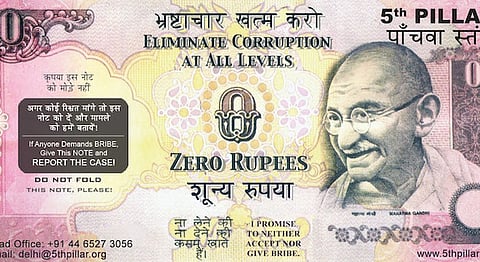
- HOMEGROWN WORLD
- #HGCREATORS
- #HGEXPLORE
- #HGVOICES
- #HGSHOP
- CAREERS
- ABOUT US
- CONTACT US

After marching from Ahmedabad to Dandi in 1930 as an act of civil disobedience, citizens of India in 2016 have taken things up or down a notch (depending on how you see things) by carrying zero rupee notes in their wallets as a very similar form of resistance. Whatever the value of zero may be today, these notes signify otherwise and are now in many ways the most valuable possession in over 2.5 million pockets across India. They’re not the kind of notes that can buy you your regular materialistic assets, but they represent something far more valuable as far as ideology is concerned--the fight for an anti-corrupt government.
In 2007, the Zero Rupee Note campaign was started by the5th Pillar organisation to facilitate the fight against corruption. An advisor of media and process of 5th Pillar, Ravi Sundar, explains, “We started doing a lot of social work in rural and urban areas but later we realised that constraining ourselves to such work was not affecting the functionality of the government. Therefore we came up with a campaign that would affect the government directly.” The organisation started distributing these notes to the masses at railway stations, bus stations, and busy market areas. And by doing so, they motivated people to give these notes to the police and other corrupt officials when asked for bribes.
Simultaneously, these notes when exchanged, began installing fear and shame in these corrupt officials. Based on the Gandhian principles, these notes have also helped in replacing the heated encounters with corrupt officials with tongue-in-cheek humor as a form of nonviolent resistance. Although, the exchange of these notes is not only a medium to mock the officials or embarrass them with shame but also to transfer the responsibility to fight corruption on a cultural level. The text, ‘I promise to neither accept nor give bribe’ printed on the note signifies this transfer of responsibility as the circular cycle of corruption can only be mended if each and every individual vows to uphold the same.
[caption id=”” align=”aligncenter” width=”624”] Source: https://archive.informationactivism.org[/caption]
Originally started in Tamil Nadu, this movement has now moved geographically all across India. The notes can be digitally downloaded from 5th Pillar’s website as they are now curated in different regional languages. “We found to our surprise that most government officials didn’t treat people well until the zero rupee note started installing moral fear in them. Realising that the individual is backed by an organisation, the officials were forced to do their work with honesty.”, adds Sundar when asked about the impact of the note. 5th Pillar estimates that 2.5 million notes have been distributed across the country in the last nine years. The success of the note is difficult to derive due to its mass distribution but their website has anecdotes such as this one:
“Mr. Ashok Jain went to retrieve his towed car from Chennai’s C1 police station. The police asked him to pay Rs. 800 (Rs. 150 fine + Rs. 650 bribe). Mr. Jain said he would pay in exchange for a receipt, which the police wouldn’t give. After much talking and pleading, Mr. Ashok called his friend Vinod Jain, who came to the station and handed a Zero Rupee Note to the police. The police saw the note, withdrew their demand for the bribe, accepted the Rs. 150, and gave the receipt without question.”
Moreover in 2008, the campaign opened its gates globally via the launch of zerocurrency.org where one can easily, digitally avail an anti-corruption note in currencies of all the 196 UN recognised countries.
Words: Karan Kaul
